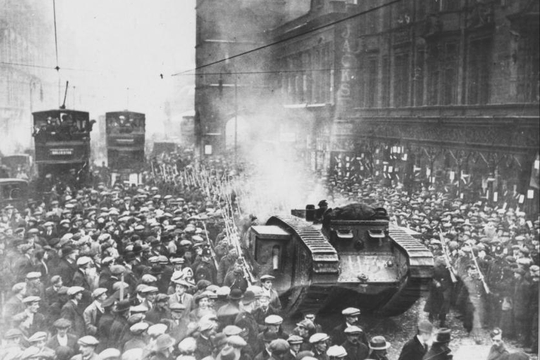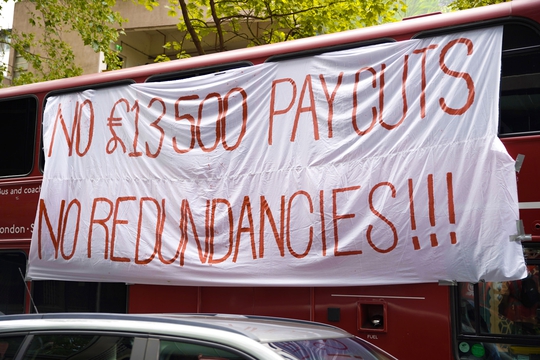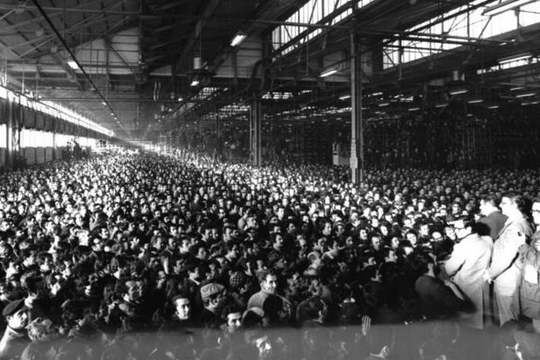The Need for a National Programme
by
J.T. Murphy
January 31, 2024
From the December 13th, 1919 edition of The Workers’ Dreadnought.

theory
The Need for a National Programme
by
J.T. Murphy
/
Jan. 31, 2024
From the December 13th, 1919 edition of The Workers’ Dreadnought.
In the article below, first published in Sylvia Pankhurst’s communist newspaper “The Workers’ Dreadnought” on 13 December 1919, J.T. Murphy argues for the increased necessity of industrial, wide-scale organisation in the face of developments in the capitalist organisation of work and the growing social division of labour. He continues by criticising practices of “workers’s control” that only subsume trade union activities into the management of capitalist organisation.
Although published over 100 years ago, we think this article still has relevance today, and therefore we have re-published it in anticipation of our co-hosted book launch of J.T. Murphy’s “The Workers’ Committee” at the Marx Memorial Library on Friday 16th February @ 7pm.
Thank you to our comrade Callum for kindly discovering, transcribing and sharing this article.
The surging tide of demands from the industrial organisations of the working class grow no less in volume. From every section they are brought forward and usually without any regard for the demands of others or consideration of the ways and means of giving effect to them. It is more often by accident that demands coincide than as a result of real co-operation of the various organisations. Indeed, it is remarkable that these demands should manifest so many points of agreement as they do. Yet the fact that they are conceived in disconnected fashion is strongly emphasised by the sectional methods pursued in order to attain them. It is deplorable that such should be the case after the many grievous struggles throughout the centuries of trade union experience.
The rapid concentration of power in capitalist organisations of the State has now brought us to the stage when no big move can be made by any section of labour without an immediate mobilisation of all the forces at the disposal of the employing class. It can be safely asserted that the rapidity with which the Government of the day moves to prevent any strike is an indication of the power we can exercise to effect our demands. To persist, therefore, in making sectional challenges to the powers that be, is the height of foolishness.
Moreover, the highly complex stage which we have reached in the development of the industrial machinery of society makes it almost impossible for any section of the workers to be involved in strikes without the remainder being placed in the position of constitutional blacklegs, directly or indirectly assisting the employing class in maintaining its domination over the workers. These facts, impressive in their significance, urge the unification of our forces and the drawing together to formulate demands of a character which shall be generally applicable to all the workers, and only variable according to the character of the industry in which the different sections of workers are engaged. The relationship of the demands to the unifying process is all important.
We organise for a purpose, we must unify for a purpose. To talk of a “General Staff” and to have no definite goal other than a wilderness in which to wander is an intolerable anomaly. To have a “General Staff” to lead us to a wrong goal is equally intolerable. But no General Staff exists in the industrial army of the workers, nor has the unification of demands yet been accomplished. Even where the industries have become more or less clearly defined, and the industrial organisations have approximated thereto, a variety of programmes exist.
Within the mining industry, there is the Sankey Report, the original demands of the Miners’ Federation, the demands of the unofficial section in the South Wales coalfield: demands re Income Tax and the like. In the building industry, proposals are afoot for Industrial Councils and a variety of wages demands. A railway shopman’s programme exists, alongside demands for part control. In the engineering industry, there are varying demands, but little of a comprehensive character.
And so we can proceed throughout the whole range of industry and find the sectionalised productions floating hither and thither. But however much these may vary, one feature of vital significance to the future of the working class is contained in a number of the schemes I have mentioned. In the mining, building, and railway programmes, the demand for control of industry has exhibited itself. The form it has taken, indicates the tentative, hesitant manner in which the trade union leaders have groped towards the great issues involved in the struggle of the working class towards freedom, the degree of conservation latent in their institutions and the influence of the revolutionary thought of the era we have entered. The mark of the “simple” trade unionist is upon all the schemes. Big things have been conceived in little terms. Class issues are approached piecemeal, with consequences undesirable and regrettable. So much is this the case, that the idea of trade union leaders moving onto the management boards of capitalist enterprises is deemed to be part control by the workers, when in reality, it means a combination of capitalists and trade union leaders for the exploitation of the working class.
“Control” which leaves in subjection the vast army of labour, is a snare and a veritable danger to them in their struggle towards freedom. Any control which they may exercise, however, demands organisation which can function in the everyday operations of industry. This demand for the organisation of the workers in workshops, factories, mills and mines, in yards and on railways, is recognised and perverted in the direction of the stabilisation of Capitalism. In order to challenge this process in every direction, therefore, it is imperative that the rank and file shall themselves review these programmes, draw out of them all elements of a perverted character, and put into them such proposals that do not detract the workers from the historic task they are now called upon to perform. Such a programme is urgent and necessary to guide and direct our efforts.
With common objectives before the various industrial workers, with a clear recognition of what such a programme will demand, the workers can be mobilised effectively, a General Staff be formed, and the surging movements of the workers be converged towards the common good.
The Conference of January 10th and 11th, 1920 convened by the National Administrative Council of the Shop Stewards’ and Workers’ Committees is asked to draw up such a programme, and every committee, whether in workshop, factory, mill or mine, is invited to elect delegates, send for preliminary agenda, discuss the problems and make their proposals. No time should be wasted. Courage, initiative, audacity, clear thinking, a definite purpose — these things this hour of history demands of every member of the working class. Inertia is fatal. Inertia must not prevail.
author
J.T. Murphy
Subscribe to Notes from Below
Subscribe now to Notes from Below, and get our print issues sent to your front door three times a year. For every subscriber, we’re also able to print a load of free copies to hand out in workplaces, neighbourhoods, prisons and picket lines. Can you subscribe now and support us in spreading Marxist ideas in the workplace?
Read next

Syndicalism and the New Limits of Trade Unions
by
Roberto Mozzachiodi,
Matthew
/
Dec. 28, 2023

